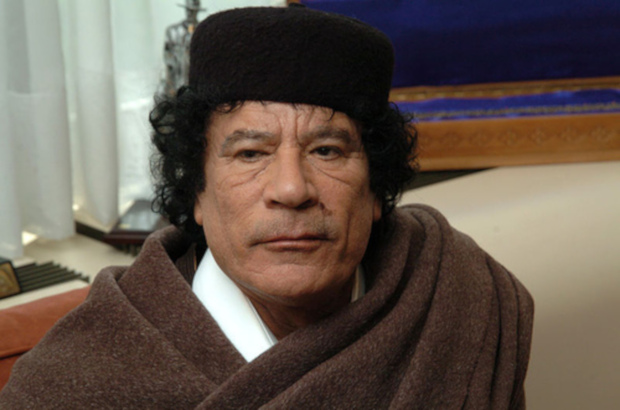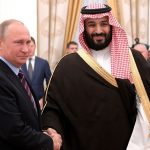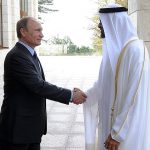by Charles Davis
According to non-partisan, pan-ideological lore in 2017, Libyan dictator Muammar Gaddafi gave up his quest for nukes in 2003—spooked by the Iraq war or strong-armed by imperialism or just trying to be nice, depending on the lesson plan. But instead of making his regime more secure, the gesture only secured his eventual downfall.
“North Koreans invariably mention the former Libyan leader Muammar Qaddafi,” Evan Osnos wrote in The New Yorker following a recent trip to Pyongyang. And these North Korean officials cite the officially prepared narrative: that in December 2003, following talks that the U.S. president said began when the U.S. and UK invaded Iraq nine months earlier, the government of Colonel Gaddafi announced it was giving up on nuclear deterrence.
As Bush recounted in his 2004 State of the Union address, “the leader of Libya voluntarily pledged to disclose and dismantle all of his regime’s weapons of mass destruction programs, including a uranium-enrichment project for nuclear weapons.” Gaddafi, Bush said, “correctly judged that his country would be better off and far more secure without weapons of mass murder.”
The North Korean state, seeing how Gaddafi was executed less than eight years later by rebels with NATO air support, claims to have learned a lesson: that the Libyan leader signed his death warrant when he traded weapons for diplomatic relations. “It has been shown to the corners of the earth that Libya’s giving up its nuclear arms, which the U.S. liked to chatter on about, was used as an invasion tactic to disarm the country,” North Korea’s Foreign Ministry said in a 2011 statement. A Foreign Ministry official repeated the claim in an October 5 interview with Nick Kristof, which The New York Times columnist left unchallenged.
This is also the tidy narrative adopted by the current White House to explain why diplomacy won’t work with Pyongyang. “The lessons that we learned out of Libya giving up its nukes is, unfortunately, if you had nukes, never give them up,” U.S. Director of National Intelligence Dan Coats said at the Aspen Security Forum in July 2017. A write-up in The Intercept reported that comment as detailing how, with respect to proliferation, “we got to this point,” a fact—disarmament followed by regime change prompting others to build and test more nukes—“shamelessly denied” by the previous administration.
Business news network CNBC has likewise speculated that North Korea’s “refusal to drop its nuclear weapons program may have a lot to do with the fate that met [Gaddafi],” while Doug Bandow of the libertarian Cato Institute is less equivocal, saying that, with respect to Libya, “Pyongyang saw America’s policy plain.”
Farewell to Arms?
But Libya never gave up nuclear arms; it never had them—it hardly even had what might be called a “program.” And that 2003 deal was followed not by preparations for war against a newly disarmed enemy, but a shameful period of normalization that saw respected politicians in the U.S. and Europe flatter the Libyan dictator with praise and arms, all while their governments abducted and extradited his political opponents.
Amid that deplorable friendship, North Korea, in 2006, conducted its first nuclear weapons test. As analyst Samuel Ramani argues, it was the NATO intervention in Kosovo, and “NATO’s decision not to remove [Slobodan] Milosevic from power in 1999,” that informed North Korean policy to build up a conventional and nuclear deterrent. “From Pyongyang’s vantage point, NATO’s restrained military intervention in Yugoslavia demonstrated that the United States was only willing to carry out military interventions if they resulted in few casualties,” Ramani writes.
What happened in Libya years later may not have discouraged Pyongyang’s thinking with respect to deterrence, but it was at best a data point. And the Islamic Republic of Iran, for years in the crosshairs of America’s most belligerent militarists, even cheered Gaddafi’s downfall, congratulating the Libyans for changing their regime with a “popular uprising.” It then agreed to curb its own nuclear program.
That Libyan WMDs were real and a threat has served everyone’s interests. Gaddafi had since the late 1990s sought “normalized relations with the United States,” former CIA analyst Flynt Leverett noted in a 2004 piece for the Brookings Institution, while Bush and Blair, dealing with an insurgency in Iraq, desired vindication. A dictator giving up his WMDs, just months after the March 2003 invasion, would do just right.
As with Iraq, however, inspectors found no evidence to back the atomic hyperbole. In February 2004, three months after the weapons deal was announced, the International Atomic Energy Agency issued a report declaring that its inspectors could find no facilities in Libya “dedicated to nuclear weapon component manufacturing.” What it found instead, by way of Libyan officials, were “a series of engineering drawings relating to nuclear weapons components” and “notes (many of them handwritten) related to the fabrication of weapon components.”
Libya did possess some potentially dual-use nuclear components, including two centrifuges and uranium hexafluoride with which to feed them, according to the Arms Control Association. But, according to the IAEA, there was no evidence the Libyan regime ever tried to build a nuclear weapon.
Libya Rewarded
Giving up this on-paper nuclear program was richly rewarded. Within four months, British Prime Minister Tony Blair was extending Gaddafi the “hand of friendship,” naming General Robin Searby his government’s “defense coordinator with Libya under an agreement to advise and train members of the Libyan army,” according to The Independent. Critics, the account continued, complained that Libya’s “capacity and willingness to develop and deploy WMDs has been exaggerated to make the diplomatic breakthrough appear much more significant.”
General Searby would himself echo those critics years later, telling Al Jazeera in 2011 that Libyan weapons programs were so primitive that “they tried to make things fly which would go a few yards then explode or turn around head straight back towards them.” Although there were chemical weapons and stockpiles of chemicals that could have been used to make more—the last removed in 2016, post-regime change—Searby said he had “no knowledge” of the biological weapons said to be part of the deal, an apparent embellishment.
By the time that news came out, the Libyan government had already obtained over $143 million in weapons and other military equipment from British arms dealers, including the riot gear and tear gas that security forces used against Arab Spring protests against Gaddafi’s regime. Many other Western governments supplied the bullets, with the European Union selling $1 billion in arms in the five years following the lifting of the arms embargo on Libya, with Gaddafi promising—for a fee—to help keep Black migrants out of Europe.
Rather than plan for a full-scale invasion against a freshly neutered pest, the U.S and Europe propped up the Gaddafi regime, snatching families and delivering them to be detained and tortured by the Libyan government. On the eve of the Arab Spring, the U.S. government was preparing not for war, but for business “on an increasing scale,” according to the Associated Press, having planned to sell the Libyan military $77 million in armored troop carriers. Military exports were only suspended weeks after the first reports of massacres carried out by forces who benefitted from U.S. military training (with Blair whispering in the ear of “the leader” to try and talk him down).
Just as it served the political and financial interests of many to pretend that the 2003 deal with Libya was more than spectacle, it has been useful to many of all political stripes, post-2011, to omit the fact that Gaddafi’s relations with the West had been normalized and that Libya had become just another place to sell weapons, buy oil, and deposit the unfortunates kidnapped by the CIA and MI6.
Gaddafi was never the reformed villain Bush and Blair made him out to be, nor was he an anti-imperialist martyr done in by naiveté and disarmament. If the West had thought him more of a burden than a viable business partner back in 2003, the Libyan military (and its missiles that wouldn’t fly right) weren’t standing in the way of changing his regime.
It serves a popular storyline to act otherwise, with all sides, foreign and domestic, now omitting years of incriminating friendship. But the propaganda we serve ourselves is now serving to inform policy in an increasingly authoritarian dystopia: the Trump administration’s United States, which believes this tale to be evidence that diplomacy is no way to achieve disarmament. Truth is often a casualty of war, and mutually agreed upon deception is also a damningly myopic way to prevent one.
Charles Davis is a journalist in Los Angeles whose work has been published by outlets such as Al Jazeera, The Daily Beast, The New Republic and Vice. Photo: Muammar Gaddafi (openDemocracy via Flickr)






If I remember correctly, during the Valerie Plane-Joe Wilson episode, she was credited with identifying a shipment of nuclear related items going from North Korea to Libya, and arranging for it to be intercepted. Also, I doubt that Gadaffi’s military had US training. They were mainly African mercenaries from Mali and Niger who abandoned him before they could massacre anyone. If he had a loyal army, why was Gadaffi abandoned to hide in a drain pipe in Sirte? They were Africans who took their arms and returned to their countries that became flooded with the stuff. “Snatching families”? Can’t believe that. Article lacks credibility.
I thought the overthrow and slaying of Gadaffi was ill-considered. Gadaffi had stated a number of times the Europe needed him to prevent a gigantic flood of sub-Saharan Africans from heading north across the Mediterranean. He was of course correct.
North Korea is surely correct in deciding that nukes are a deterrent. Unlike the USA, which under Bush 2 abandoned the “no first use” the five “legal nuke powers” had agreed to, DPRK wants recognition, a peace treaty from the Korean War and a promise by the USA not to attack them. This is hardly unreasonable, unlike the US position-give up all and be vulnerable.
btw, Gaddafi brought wealth and development to Libya, accepted and gave jobs to other Africans, and warned Europe of the likely results it he were to be removed-it was all true .
“the U.S and Europe propped up the Gaddafi regime, snatching families and delivering them to be detained and tortured by the Libyan government. ” That is what is happening now.
Thank you, this is all true and should be recognized. But let’s look forward, and Korea is the current issue, a country which has been devastated by US aerial bombing in the past, unlike Libya prior to the recent US aggression. We’re talking (in Korea) of intensive aerial bombing of cities, infrastructure, even dams flooding agricultural fields. A true war crime, many deaths, unpunished because the US did it.
So then rosemerry’s comment applies. The US should quit that war and get out. That’s the issue. Just do it.
Disappointing article. Was it really necessary to write an entire article to point out that the Bush administration used Gadhafi’s reconciling with the West for all the PR it was worth, even to the point of exaggeration? Seriously? I’m not fan of the Bush administration, but to write this article as if it is even significant, while ignoring the truly outrageous actions of the follow on administration who basically sent the country into complete chaos because… well, just because they felt like it, is sad.Obama and HIllary went to war, directly killed thousands, and fomented a civil war that has killed and displaced hundreds of thousands, and we want to talk about how Bush exaggerated the significance of something 10 years before? Wow.